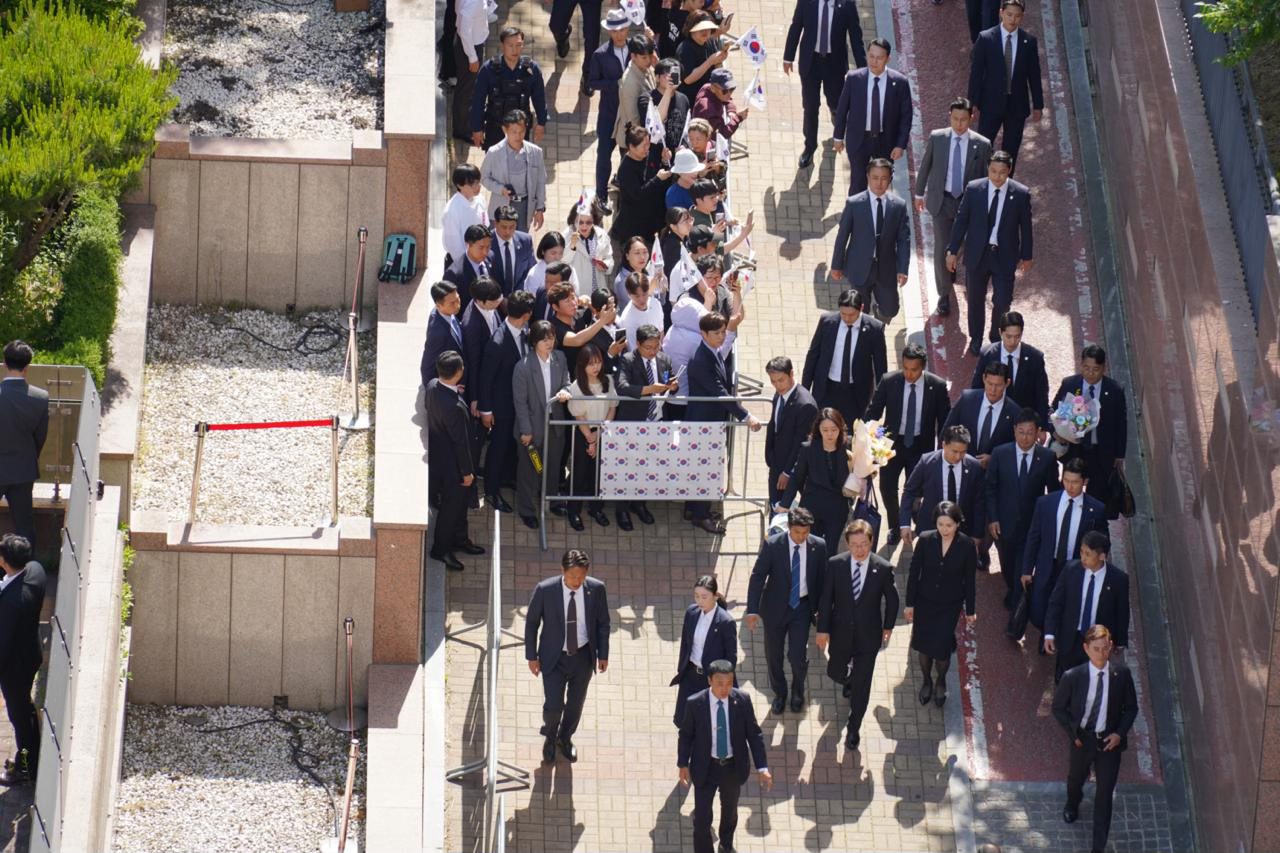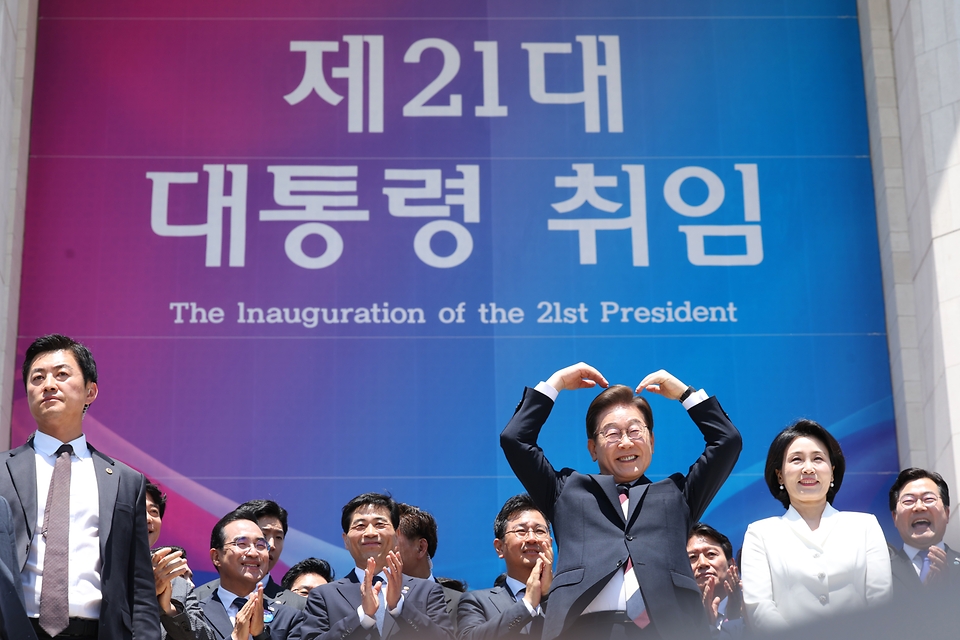My neighbor’s become the new President of South Korea, but I’ve never seen him in person.
It started with a police motorcade. A friend who visited us a few days before the election saw one pull into my neighborhood. On the same day my wife saw a group of people surveying my apartment complex.
A day before the election, I saw a bunch of tall, slicked-back guys in suits that scream “secret service” roaming around the underground parking lot. The press began to set up cameras and police started a patrol.
Yes, Lee Jae-myung lives here. I was even able to take photos of Mr Lee’s first morning as the new President, from my bedroom window:

But the neighbors seemed perplexed. At a Chinese restaurant, my favorite in the neighborhood, I heard people saying they were simply surprised to find out he had been living here.
A lawmaker who doesn’t live in his constituency
Let’s zoom out a bit. Lee Jae-myung was a lawmaker representing this constituency until he was elected as the President. I knew he had moved here, only because some zealous Lee supporters from my wife’s community garden told me so. But I’ve never seen him in person. Neither have they—except a few alleged sightings of his wife, now the First Lady.
Can you imagine a local constituency lawmaker who’s all but invisible to his constituents? Mr Lee, in fact, has no prior relationship with my constituency at all. He built his political career in Seongnam, some 40km away from my neighborhood, and his last public post before representing my constituency was the governor of Gyeonggi province, a province my constituency isn’t even in.
I’m telling you all this because it’s now more personal to me. Hey, the President lives in my neighborhood! Do you think the value of my apartment will surge? The result proves it has the best fengshui!
And it also tells us how extraordinary Mr Lee’s journey to the power has been.
How did he get to represent my constituency then? It goes back to 2022. In March, Mr Lee lost the presidential election to Yoon Suk-yeol. Having resigned from the Gyeonggi governership to run, he had no official position. As the local elections in June drew near, a Minjoo lawmaker representing my constituency resigned to run for the next Seoul mayor. Historically a Minjoo stronghold, running for an Assembly seat representing my constituency in a Minjoo blue jacket is a surefire way to get elected. Mr Lee jumped right in for the by-election.
Of course there were plenty of criticism. If he wanted to run for an Assembly seat, there was also a by-election for a seat representing a district in Seongnam. But unlike mine, that constituency recently elected conservatives a few times. Facing multi-pronged legal threats, it appears Mr Lee wanted a seat in Yeouido—being a lawmaker in times of judicial warfare gives a lot of perks, including immunity from arrest—so badly that he couldn’t afford to take chances.
So Mr Lee was elected as a lawmaker representing a place he doesn’t know and has no connection with. It’s been three years. Did he actually live here? I began to ask around. At a hair salon, which is usually the best place to do this, I learned that Mr Lee allegedly moved in with his belongings in just a single 1-ton truck.

It’s sensible that Mr Lee decided to move into his predecessor’s residence right after taking office, but reading the news, I couldn’t help but wonder if he ever had a proper bed at his “home.”
‘Your poisoned chalice is on the way’
Despite his undisputed win, the question of legitimacy will haunt Mr Lee for his entire term.
His presidential privilege now protects him from further court proceedings, but it doesn’t mean his legal threats are over as they are simply “suspended.”
A few days before the election, the Supreme Court overturned the lower court’s decision in Lee Jae-myung’s election law violation case and remanded it, suggesting a guilty verdict. Had Mr Yoon chilled out and enjoyed his presidency, Mr Lee wouldn’t be able to run for the election.
Mr Lee’s closest associates weren’t as lucky as him. Kim In-seop was sentenced to five years in prison for his involvement in the Baekhyeon-dong case. Lee Hwa-young, whom the readers of this newsletter may find familiar, was sentenced to more than seven years by the Supreme Court. (There could be more scandals being uncovered in the coming years—for example, his long-time personal assistant who somehow owns properties worth about $6 million.)
Other than the election law violation case, there are four more court case against him, which will probably be suspended as the election law case is. What happens after his term? South Korea’s presidency has always been a poisoned chalice but never this obviously. It’s almost like ordering Uber Eats. “Your order is on the way! Estimated arrival: June 2030”
Mr Lee will try everything in his power to avoid jail. Minjoo’s aborted attempt (for now) to court-packing is one example. Additional efforts to bring justice to the justices—for Minjoo radicals, “court reform” is already the new “prosecution reform”—will likely further erode the rule of law.
We’ve already seen a sort of Streisand effect—an act in attempt to evade something, in turn, accelerates the very thing it tried to evade—in Korean politics: the downfall of Mr Yoon. Still, it remains a mystery why Mr Yoon attempted the coup. The best I can guess is that he may have thought it was the only way to keep his wife from jail.
People in Yongsan gossiped last year that Kim Kun-hee was so concerned about ending up in jail that the First Lady kept nagging Mr Yoon to do something, even threatening a divorce. The best strategy would have been to accept opposition’s demand for special prosecutors but assert “impartial” ones. Getting investigated is no good indeed, but it is much worse after you lose power.
Instead, Ms Kim, in effect, stomped on the gas pedal on the highway to jail.
A maximalist approach can backfire. Mr Lee and Minjoo should contemplate his predecessor’s failure.
